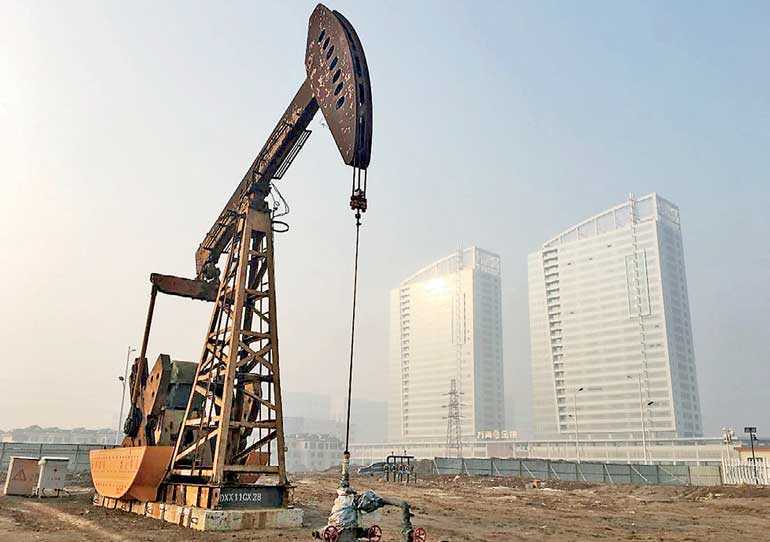Thursday Feb 19, 2026
Thursday Feb 19, 2026
Wednesday, 7 November 2018 00:00 - - {{hitsCtrl.values.hits}}

A pumpjack is seen at the Sinopec-operated Shengli oil field in Dongying, Shandong province, China - REUTERS
Singapore (Reuters): Oil prices fell on Tuesday, weighed down by sanction exemptions from Washington that will allow Iran’s biggest oil customers to keep importing from Tehran, as well as by concerns that an economic slowdown may curb fuel demand growth.
US West Texas Intermediate (WTI) crude futures were at $ 62.86 a barrel at 0800 GMT, down 24 cents, or 0.4%, from their last settlement.
International Brent crude oil futures were down 48 cents, or 0.7%, at $ 72.69 a barrel.
Analysts said expectations of an economic slowdown in coming months were weighing on the fuel demand outlook, while concerns eased on the supply-side after Washington granted sanction waivers to eight importers of Iranian oil that will allow them to continue purchases.
Washington gave 180-day exemptions to eight importers - China, India, South Korea, Japan, Italy, Greece, Taiwan and Turkey. These are Iran’s biggest buyers, meaning Iran will be allowed to still export some oil for now.
While Iran’s crude exports could fall to little more than 1 million barrels per day (bpd) in November, traders and analysts say that figure could rise again from December as importers - including China, Japan and South Korea - use their waivers to order crude from Iran.
China was given a waiver to import around 360,000 bpd from Iran during the exemption period, sources told Reuters, while South Korea was given a daily quota of around 130,000 bpd, according to Platts.
Japan said on Tuesday it would soon raise Iran imports in accordance with the waivers.
Because sanctions on Iran had already been priced into oil markets, Jameel Ahmad, head of market research at futures brokerage FXTM said he would “instead focus more heavily on the global demand outlook because of the ongoing external uncertainties weighing down on economic prospects.” Ahmad added that he saw a slowdown in economic and fuel demand growth as “more of a risk for oil over the coming months.” Currency weakness is putting pressure on key growth economies in Asia, including India and Indonesia.
At the same time, the trade dispute between the United States and China is threatening growth in the world’s two biggest economies.
On the supply-side, oil is in ample availability despite the sanctions against Iran as output from the world’s top-three producers, Russia the United States and Saudi Arabia, is rising.
The three countries combined produced more than 33 million barrels per day (bpd) for the first time in October, meaning they alone meet more than a third of the world’s almost 100 million bpd of crude oil consumption.
Amid ample supply, top crude exporter Saudi Arabia has cut its December price for its Arab Light grade for Asian customers by 10 cents per barrel versus November to a premium of $ 1.60 a barrel to the Oman/Dubai average, state oil company Saudi Aramco said on Monday.
The price pressure on oil has scared off financial traders.
Hedge fund managers were net sellers of petroleum-linked futures and options for a fifth week running last week as concerns about sanctions on Iran evaporated and investors refocused on economic worries.
Portfolio managers have been net sellers of 371 million barrels since the end of September, taking their net long position to the lowest level for 15 months, according to records published by regulators and exchanges.